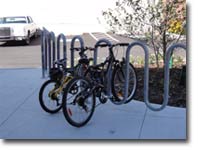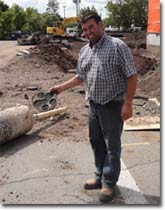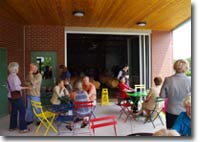Other Features
 Care was taken to source as many locally manufactured materials as possible, from furniture to steel. This not only helps the Nova Scotia economy but by moving materials a shorter distance less fuel is required, in turn helping Co2 emissions. An example are the study and bistro tables. These are made from Nova Scotian sourced birds eye maple by MacLean Bros. Woodworking of Antigonish. Good for the environment and good for the local economy.
Care was taken to source as many locally manufactured materials as possible, from furniture to steel. This not only helps the Nova Scotia economy but by moving materials a shorter distance less fuel is required, in turn helping Co2 emissions. An example are the study and bistro tables. These are made from Nova Scotian sourced birds eye maple by MacLean Bros. Woodworking of Antigonish. Good for the environment and good for the local economy.
Many of the products used in construction, such as the flooring, were made from recycled materials. As well, some materials such as the River Denys marble in the entry and circulation area are natural Nova Scotian materials that will last many lifetimes.
And from the bicycle rack to convenient, well lit sidewalks many of the design features encourage walking, cycling, and healthy living. Not only do they help your overall health they save energy. Please consider this when visiting the library, can I walk or cycle? If I do drive downtown can I park and walk from the library to businesses without using my vehicle? Every bit helps.
Adaptive Reuse and Soil Improvement
 The building you are standing in was built sometime in the 1940's and had several uses over the years. By renovating the existing building, rather than tearing it down, we saved a large amount of material from going to the landfill. This is called adaptive reuse and is important, especially when building in downtown areas. In addition, highly durable materials were used in construction, allowing this building to stand the test of time, diverting further materials from the landfill in the years to come.
The building you are standing in was built sometime in the 1940's and had several uses over the years. By renovating the existing building, rather than tearing it down, we saved a large amount of material from going to the landfill. This is called adaptive reuse and is important, especially when building in downtown areas. In addition, highly durable materials were used in construction, allowing this building to stand the test of time, diverting further materials from the landfill in the years to come.
As excavation proceeded on site we found a number of different soil conditions. Parts of the old theatre were buried in the late 1960's and an old oil tank, still with heating fuel, was found. Soil that could be used was left on site, while the remaining materials were disposed of properly at special landfill sites. Clean fill was then used, preventing contaminants from entering the Brierly Brook over time.
Greenhouse Gas Reduction
 A critical issue in global warming is an excess of Carbon Dioxide (Co2) in the atmosphere. Co2, while necessary for life on earth, is a greenhouse gas in large concentrations.This excess comes primarily from the burning of fossil fuels such as coal, oil, and natural gas. In Nova Scotia, much of our electricity comes from coal fired generating stations. Reducing the amount of electricity consumed will directly reduce the amount of coal and other Co2 producing materials used in these generating stations. The library uses several methods to reduce its use of electricity from this source.
A critical issue in global warming is an excess of Carbon Dioxide (Co2) in the atmosphere. Co2, while necessary for life on earth, is a greenhouse gas in large concentrations.This excess comes primarily from the burning of fossil fuels such as coal, oil, and natural gas. In Nova Scotia, much of our electricity comes from coal fired generating stations. Reducing the amount of electricity consumed will directly reduce the amount of coal and other Co2 producing materials used in these generating stations. The library uses several methods to reduce its use of electricity from this source.
• Geothermal heating and cooling
• Insulation and high performance barriers
• Solar Power
• Occupancy sensors
• LED and low energy lighting
• Daylighting
• High performance glazing
• Energy Star rated appliances
Education
 The Pictou-Antigonish Regional Library, ACALA (Antigonish County Adult Learning Association), and Health Connections are committed to helping citizens learn more about how to create a sustainable and healthy community. Through books, programs, and activities we pledge to help ensure a green future for everyone. We recommend you get a free public library card. This card
lets you borrow all of the materials the
library has, then return them for someone
else to use. Recycling at its best!
The Pictou-Antigonish Regional Library, ACALA (Antigonish County Adult Learning Association), and Health Connections are committed to helping citizens learn more about how to create a sustainable and healthy community. Through books, programs, and activities we pledge to help ensure a green future for everyone. We recommend you get a free public library card. This card
lets you borrow all of the materials the
library has, then return them for someone
else to use. Recycling at its best!
If you have any suggestions please feel free to share them with us. And please take time to learn more about your public library, the People's Place!





